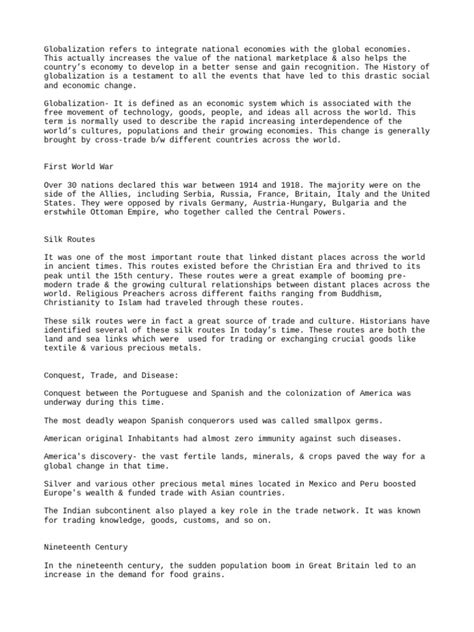Introduction

The College Board’s Advanced Placement (AP) World History course delves into the intricate tapestry of global history, examining the interplay of major themes that have shaped human civilization. This comprehensive course provides students with a solid foundation in world history and prepares them for college-level coursework.
AP Themes
The AP World History framework is organized around six overarching themes that guide the curriculum:
- Interaction between Humans and the Environment: How humans have shaped and been shaped by their surroundings.
- Development and Interaction of Cultures: The evolution and diffusion of cultural practices and beliefs.
- State-Building, Expansion, and Conflict: The formation, expansion, and interactions of political entities.
- Creation, Exchange, and Diffusion of Knowledge: The advancement and dissemination of ideas and technologies.
- Identity and Migration: The construction of individual and collective identities, and the movement of people across borders.
- Power, Authority, and Governance: The distribution and exercise of power within and among societies.
Content and Skills
The AP World History curriculum covers a vast chronological and geographical scope, from the emergence of settled agriculture to the present day. Students engage with primary and secondary sources, develop historical thinking skills, and conduct research to gain a comprehensive understanding of global events and their interconnectedness.
Primary Sources:
- Historical documents: Letters, treaties, legal codes, and other written records.
- Non-written sources: Artifacts, architecture, paintings, and other tangible remains of the past.
Historical Thinking Skills:
- Chronological reasoning: Placing events in a chronological context.
- Cause-and-effect analysis: Identifying the factors that lead to historical outcomes.
- Comparison and contextualization: Drawing connections between events and comparing different historical experiences.
- Historical evidence evaluation: Assessing the credibility and significance of historical sources.
Historical Topics
The AP World History curriculum encompasses a wide range of historical topics, including:
- Ancient civilizations (c. 3500-500 BCE): Mesopotamia, Egypt, India, China, Mesoamerica, and Andean South America.
- Classical and Post-Classical civilizations (c. 500-1500): Greece, Rome, India, China, Islam, and sub-Saharan Africa.
- Early Modern Europe (c. 1500-1800): The Renaissance, Reformation, Scientific Revolution, and Age of Enlightenment.
- Late Modern Europe and the World (c. 1800-1914): Industrial Revolution, imperialism, and the rise of nationalism.
- Twentieth Century Global Interactions (c. 1914-Present): World War I, World War II, Cold War, decolonization, and globalization.
Strategies for Success
To excel in AP World History, students should:
- Read assigned texts thoroughly: Pay close attention to primary sources and secondary interpretations.
- Take notes effectively: Organize information according to the AP themes.
- Practice writing essays: Develop strong thesis statements and support them with specific evidence.
- Utilize review materials: Consult textbooks, study guides, and online resources.
- Seek extra help: Attend office hours or join study groups.
Frequently Asked Questions (FAQs)
- What is the AP World History exam format? The exam consists of two parts: a multiple-choice section and a free-response section.
- How is the AP World History exam scored? The multiple-choice section is scored out of 50 points, and the free-response section is scored out of 50 points.
- What is a passing score on the AP World History exam? A score of 3 or higher on the AP World History exam is considered a passing score.
- What colleges accept AP World History credit? The vast majority of colleges and universities in the United States accept AP World History credit for placement in advanced history courses.
- How can I prepare for the AP World History exam? Study regularly, practice writing essays, and utilize review materials.
- What is the best way to study for AP World History? Create a study schedule, utilize flashcards, and form study groups.
- What are some good AP World History study resources? Barron’s AP World History Review Book, Princeton Review AP World History Premium Prep, and Khan Academy AP World History.
- What is the most important thing to remember when studying for AP World History? The interconnectedness of global events is a key theme of the course.
Useful Tables
| Historical Era | Key Events | Impact |
|---|---|---|
| Ancient Civilizations | – Development of agriculture – Rise of cities – Invention of writing | – Increased food production – Growth of urban populations – Spread of knowledge |
| Classical and Post-Classical Civilizations | – Spread of Buddhism and Hinduism – Expansion of Islamic empires – Rise of the Roman Empire | – Cultural diffusion – Political and economic integration – Technological advancements |
| Early Modern Europe | – Renaissance and Reformation – Scientific Revolution – Age of Exploration | – Cultural renewal – Religious upheaval – Expansion of European influence |
| Late Modern Europe and the World | – Industrial Revolution – Imperialism – Rise of nationalism | – Economic growth and technological advancements – Expansion of European empires – Political and social changes |
Conclusion
The AP World History course offers an invaluable opportunity to explore the complexities of human history. By investigating the interconnectedness of global events and developing historical thinking skills, students gain a deeper understanding of the world around them. Whether pursuing careers in history, social sciences, or other fields, AP World History provides a solid foundation for future success.
